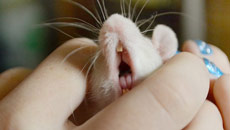Making sense of at which direction and at what speed a car is moving may not be possible without the interpretation of the brain, but processing of some of these information starts right at the retinas of the eyes.
Researchers have now explained how the various types of cells in the retina are wired to help the eyes detect the direction and speed of moving objects.
"The wiring diagram represents only a tiny proportion of the total number of connections on the retina," said Sebastian Seung, a computational neuro scientist at Massachusetts Institute of Technology in the US.
To understand how cells are wired together in the retina, the researchers analysed high-resolution electron microscope images of a mouse retina with the help of nearly 2,200 members of EyeWire, an online ‘citizen-science' game set up to help with brain-mapping efforts.
Players traced the pathways through the layers of cells to create a high-resolution wiring diagram of part of the retina.
The reconstructed map showed that while one type of bipolar cell (that transmit signals from the photoreceptors to the ganglion cells) connects to the amacrine cells (responsible for 70 percent of input to retinal ganglion cells) filaments close to the cell body, another does do so farther away along the length of the filaments.
The bipolar cells that connect closer to the starburst amacrine cell bodies are known to relay their messages with a time delay, whereas the others transmit their immediately, the researchers discovered.
Because of the lag in the first type of connection, signals that hit two nearby locations on the retina at two slightly different times - as would happen when an object moves across the visual field - could reach the same amacrine-cell filament at the same time.
According to the researchers, the following could help explain how the retina detects motion: The amacrine cell might fire only when it receives this combined information, signalling that something is moving in the direction of the filament.
Stimuli not moving in the direction of the filament would produce impulses that reach the amacrine cell at different times, so that it would not fire.
The study appeared in the journal Nature.





